
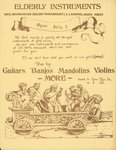
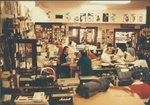


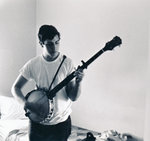
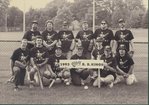
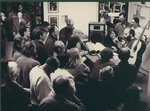

The tune was pretty shaky at first, but it’s lasted 50 years now.
When Elderly Instruments opened July 5, 1972, in a basement in East Lansing, it was a 10-foot by 12-foot cubicle with a few picks and a handful of used string instruments and a battered leather pouch for a cash register.
“I really had no plans,” co-founder Stan Werbin said. “It was something to do. How many 25-year-olds know what they want to do with the rest of their lives?”
Now pilgrims from around the world take a pass on Michigan’s State Capitol — a mixed blessing, at best — to smile, tune up (or not) and pick happily at Elderly’s ear candy counter of vintage and new guitars, mandolins, banjos and ukuleles.
In a research station in Antarctica, stacked in a cabinet or stuffed next to a toilet, are mail order catalogs from Elderly. In its heyday, the Elderly catalog went out to all seven continents and was recognized as a global resource by the Whole Earth Catalog.
Online sales have supplanted the catalog in the 21st century, but the creaky, wooden-floored store abides, nexus of an enduring local folk and acoustic music scene.
Elderly’s shaky song has outlasted countless economic lurches and musical cycles, only to reach new heights of cultural vindication. Mandolins have gone mainstream. Ukuleles are red-hot. With heir apparent Lillian Werbin, Stan’s daughter, on deck to take over the store, Elderly’s time has come. To tell the truth, it never went away.
Elderly baby
Elderly folklore often begins with a young Stan Werbin, haunting coffee shops and clubs in Greenwich Village in the folk revival heyday of Bob Dylan, Joan Baez and Joni Mitchell.
Werbin, 75, said that’s not quite accurate.
“I grew up in Queens. I was too young to be going off to Greenwich Village coffee houses,” he said. He followed the music scene mostly on FM radio.
He started on the “road to ruin,” as he puts it, when his brother snagged tickets to a 1961 Clancy Brothers concert at New York’s Town Hall, with special guest Pete Seeger on banjo. Werbin was so impressed with Seeger he took up the banjo right away, at age 14, and still considers himself a “lapsed” banjo player.
He was a full-fledged folkie when he came to the University of Michigan in the late 1960s to pursue a degree in biochemistry. He passed his preliminary exams, but 50 years later, a lot of people are glad he took it no further.
“Me too, believe me,” he said.
He burned off his musical energy as a songwriter, guitar and banjo player, playing weekly open mic nights at the Ark.
It wasn’t New York, but in many ways, it was better.
“The Ark exposed me to a lot of other, less mainstream folk musicians I wasn’t hearing about,” he said. “It turns out, there’s a whole world out there, like there is now. Nowadays you’d call it an indie scene.”
He recognized a fellow music lover in Washtenaw Community College student Sharon McInturff.
“I discovered the Ark Dec. 5, 1970, and for the next year and a half, I went to the Ark every night it was open,” McInturff, now Sharon Burton, recalled.
Burton was editor of the college newspaper at Washtenaw, where the only place to get a meal on campus was an Automat. She was working on an article about the food desert problem when she heard Werbin sing a song about the Automat at the Ark.
The line “we’re living in a world of machines” made an impression on her. She asked him for the lyrics. Within a few weeks, they were dating.
On an early, cheap date — a bike ride through Ann Arbor — Werbin’s bike broke down near a yard sale, where they spotted a Sears Supertone guitar from the 1940s.
“It wasn’t too expensive,” Werbin said.
It dawned on them that buying and selling used instruments was a thing one could do.
“We didn’t have real jobs,” Burton said.
They set up a table at a flea market in Ann Arbor, but it was slow going. They spent most of the day shooting the breeze with another vendor, vintage book dealer Ray Walsh, still the owner of Curious Book Shop in Lansing.
Walsh was selling books out of the basement of the unglamorous 541 building in East Lansing, then and now the home of the Flat, Black and Circular record store. He told Werbin there was an open slot in the building.
Ann Arbor didn’t need another music store, and Werbin didn’t want to compete with his friends who owned stores there.
They drove to East Lansing in Burton’s Volkswagen, with $120 in cash and a few instruments to sell. They rented a 10-foot by 12-foot space from Synergy, across the hall from Walsh’s used bookshop. Synergy was a social hub “where people would go and talk and relate to each other,” according to Burton. Hey, it was the ‘70s. Family of Man, a natural foods store, was another basement neighbor.
“Rent at the store was $120, and rent at our room on MAC was $120,” Burton recalled. They convinced both landlords to let them pay half the rent and promised that at the beginning of the next month, they’d have enough to pay the whole amount.
They made the rent, but only after selling their Victrola to the guys at Flat, Black and Circular.
“We lived low on the hog and customers took us home for dinner,” Burton said.
Werbin got the idea for the name Elderly Instruments from a classified ad in the Ann Arbor News touting a Gibson Les Paul guitar as a “nice, elderly instrument.”
“We couldn’t afford the guitar, but we stole the name,” he said.
Going global
The 1972 movie “Deliverance,” with its famous “Dueling Banjos” scene, sent nationwide interest in bluegrass banjo and guitar through the roof.
“That movie came out when we were opening the store, and we sold hundreds of little Harmony banjos and guitars,” Burton said.
It wasn’t the last time pop culture gave Elderly a sales boost. Lansing ukulele guru Ben Hassenger was working at Elderly in the mid-1980s, when Eddie Van Halen started playing his famous red Kramer guitar, criss-crossed with white and black stripes.
“We were a Kramer dealer and we went through a bunch of those,” Hassenger said.
As sales ticked up in the 1970s, Elderly bought more space in the basement of 541 E. Grand River Ave. and set up a coffee house with open mic nights on Wednesdays.
After a few years, they saw the need to keep in touch with customers who graduated from MSU or moved out of Lansing. Burton applied her newspaper and high school yearbook skills to put a catalog together, laying it all out in the pre-digital era of paper and rubber cement.
“It was going to be 16 pages, but six months later, it was 116 pages,” she said.
Hassenger coordinated many of the spectacular covers for the electric catalog, by the likes of Dennis Preston and Kate Darnell.
“People would keep it in their bathroom and keep on looking at it,” he said.
In its ‘80s and ‘90s heyday, up to 10,000 catalogs went out to all seven continents, including Antarctica.
Singer-songwriter Jen Sygit learned of Elderly through its catalog before working there in the early 2000s.
“They were one of the first reputable, trustworthy mail-order companies,” she said.
One day, Werbin and Burton tried to close the store to install carpeting, only to find two visitors from Japan at the door.
“They wanted to buy a guitar. We could not be closed,” Burton said. “People came from all over the world once the catalog was out.”
“For such a mom-and-pop operation to have such a large impact is really amazing,” Sygit said.
The catalog helped Elderly grow out of its hardscrabble early years, build a national reputation and move smoothly into internet sales in the 21st century.
The culture surrounding the catalog grew such deep roots it lasted until 2014 — a decade longer than it needed to in the era of online business, Werbin said. It generated big sales in spite of a paragraph that urged customers to support their local stores, if possible, and only use mail order as a last resort.
More Bulgarian music, please
When Cynthia Bridge dropped out of college and applied to work at Elderly in 1978, she thought a Marine Band was just a Marine band, and not a Hohner harmonica.
“But I did know what a crumhorn is, because I was into early music,” she said. The heyday of the crumhorn, a wooden double-reed instrument that tootles like a high-end kazoo, was the 16th century.
Despite botching the job application, Bridge has racked up 44 years at Elderly. It didn’t require arcane knowledge to unpack boxes, price merchandise and put things away. Before long, she was ordering accessories, instruments and other merchandise.
“In the process, I got to know the breadth of instruments and learn about musical styles I’d never heard, of or didn’t understand — Celtic music, Cajun music, bluegrass, old time music,” she said. “I felt like my ears and my world were getting huge.”
One day, a customer told Bridge the store needed “more Bulgarian music.”
“I thought, ‘Yeah, right,’” she said.
But she dug into the subject and discovered that Bulgarian choral music is a thrill like no other, an icy wind through a burning forest in your mind. She learned how to play the Bulgarian gadulka, a kind of folk fiddle with sympathetic vibrating strings, and played in “an occasional Bulgarian dance band” around Lansing.
Sygit underwent a similar expansion as an MSU student and budding songwriter when she discovered Elderly.
“I came from Maryville and Port Huron, where they only had band instruments and guitars,” Sygit said. “Elderly exposed me to a whole new world of genres, instruments and ideas. I like to fancy myself an eclectic songwriter and I partly credit Elderly for that.”
Sygit is one of many Elderly employees who have gone on to build lasting musical careers. Marcy Marxer, a former Elderly employee, became half of a multi-Grammy-winning folk duo, with Cathy Fink, racking up 36 recordings and 60 “Wammie” awards from the Washington Area Musical Association.
Elderly’s repair shop has spawned its own national superstars. Oregon guitar maker Jeffrey Elliott, Haslett banjo maker Bart Reiter and Massachusetts guitar maker and restorer T.J. Thompson all did stints at Elderly.
“They’ve always had a well-respected repair department, and that always brings people in,” Ben Hassenger said. “If someone has a really, really nice old pre-war Martin guitar, they don’t want just anybody to work on it.”
Ukulele redux
In the 1980s and 1990s, Elderly settled into a fine-tuned mix of new and vintage instruments, both electric and acoustic. In contrast to other stores, walk-in customers can try out any instrument they please, no matter how valuable. Nobody is on commission, so pressure sales tactics are unheard of.
“For quite some time, it was about 50-50 used and new,” Cynthia Bridge said. “But as eBay and Reverb.com and other platforms became more user friendly, we’ve had fewer used things.”
“We sold a lot of electric guitars,” Hassenger said, “but it was still a mecca for acoustic instruments — guitars, fiddles, mandolins, off-the-wall, weird things like a harp guitar.” (Harp guitars have additional, “floating” strings and look like the unholy offspring of a guitar, a harp and a Picasso painting.)
The store reveled in its hip un-hipness. Early catalogs contained the catchphrase “the ukulele — instrument of the ‘70s.”
“It was a joke at first,” Werbin said. Every 10 years, it was updated to “instrument of the 80s,” and so on.
Now, according to Hassenger, the ukulele really is the instrument of the 21st century. As Michigan’s official Ukulele Ambassador and the chief instigator of last weekend’s wild Mighty Uke Day in Old Town, “the largest ukulele festival in the Midwest,” Hassenger should know.
“Now Elderly is one of the major ukulele stores in the country,” he said.
In the 1960s, most Americans knew the ukulele as an odd fetish clutched by greasy-haired falsetto warbler Tiny Tim. Now, on the wings of world-wide hits like Amanda Palmer’s “Ukulele Anthem,” Paul McCartney’s “Dance Tonight” and Israel Kamakawiwo’ole’s “Somewhere Over the Rainbow/It’s a Wonderful World” medley, the ukulele is embedded permanently in pop culture.
“It’s easy to get into, but if you have the capability, you can also become a virtuoso on it,” Werbin said.
This April of this year, several members of the Ukulele Orchestra of Britain stopped into Elderly, prior to a date at the Wharton Center, and broke into a lengthy jam session.
Playing the changes
As mail-order and in-person business grew, Elderly moved out of its East Lansing basement into a foursquare brick pile near Lansing’s Old Town, the former home of the Independent Order of Odd Fellows, in 1982. (Staffers enjoy working across the street from the Robert Johnson building, even though it’s not named for the iconic bluesman.)
A dozen years later, the store oozed into the building next door, a former post office and National Cash Register building, now graced with a magnificent mural (and selfie spot for visitors from around the world) by Los Angeles artist Jennifer Springman.
Sharon Burton left the store in 1986. Werbin and Burton had already broken up after nine years “as a couple,” Burton said, but they stuck it out together at Elderly for 14 years. They are still good friends, and Burton plans to come to next week’s 50th anniversary bash.
In 1987, Werbin married Sandy Dykins, a bookkeeper at the Social Security Administration. They adopted a seven-week-old daughter, Lillian, in October 1990.
Dykins became Elderly’s bookkeeper, payroll administrator and employee benefits manager until about two years ago, and still plays a consulting role in the store.
Lillian Werbin has been swaddled in the warm and tuneful Elderly culture all her life, and now stands to inherit the operation.
Both father and daughter find it significant that Lillian started working at Elderly at 25 — the same age her dad was when he started the business.
“I’m doing my best to fill these shoes, right down to the timeline,” she said.
As musical trends and economic cycles swirl around them, the Werbins carry on with a unique combination of canny adaptation and stubborn rootedness.
“We live in a world of instant gratification, but we also live in a world of banjos and stringed instruments,” Lillian Werbin said. “Instant gratification is a bit slower to acquire.”
The COVID pandemic emptied the sales floor for nearly two years, but it also froze the whole world into an Antarctic isolation perfectly suited to move Elderly’s wares.
“After the pandemic hit, our sales of entry ukes, mandolins and guitars was astounding,” Cynthia Bridge said. “The low-end instruments nearly doubled. People would grab on to things like a Cordoba ukulele or a Kentucky mandolin — more sales than we’d ever seen.”
That dividend has played out, but Lillian Werbin is pleased by the growing diversity of the folk, roots, Americana and twang community. In a recent interview with roots music scholar Michael Eck for the MandolinCafe website, she noted a surge in younger people, LGBTQ+ people and people of color at trade gatherings and banjo summits.
The acoustic instrument industry, she told Eck, “is opening its arms and starting to accept that it's not about a certain type of person. It's about a certain type of love for this community.”
Meanwhile, Stan Werbin is easing gradually toward retirement, but it may take a while.
“We’ve already scheduled the 100th anniversary,” he said. “That’ll be July 5, 2072. Put it on your calendar now.”
Lillian Werbin intends to be there.
“I’ll be sitting there like Dad, realizing I’ve done this for 50 years and being very confused about how I got where I am.”
Support City Pulse - Donate Today!
Comments
No comments on this item Please log in to comment by clicking here